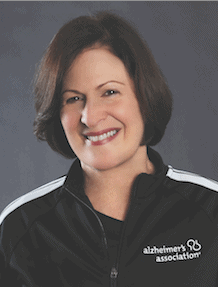
In October 1991, three separate weather systems converged over the North Atlantic creating what meteorologists called “the perfect storm” – the storm, so vividly dramatized in the movie of the same name. Although weather experts had predicted that a storm of this magnitude was inevitable, no one was prepared – with deadly results.
Over the next few decades, Americans will face another “perfect storm” with even more devastating consequences.
By the year 2050, 16 million “baby boomers” will have Alzheimer’s disease. It is estimated that one in every five New York City residents will either have this fatal disease or be taking care of someone who does.
With no prevention or cure in sight, the U.S. health care system is unprepared to withstand the extraordinary pressure of so many people ill and needing care. Alzheimer’s – which can last as long as 25 years – is a progressive brain disorder that gradually destroys a person’s memory and ability to learn, reason, make judgments, communicate and carry out daily activities like eating, bathing, and talking. It is not a normal part of aging.
Alzheimer’s is the only cause of death among the top ten in the United States that cannot be prevented, cured or even slowed. In fact, as the Alzheimer’s Association 2013 Facts & Figures shows, today in the United states, one in three seniors dies with Alzheimer’s or another dementia.
Our current health care system lacks adequate beds in nursing homes and hospitals and does not have enough trained health care workers for either residential or home care. Insurance coverage to supplement expenses for caregiving is inadequate and inflexible family-leave policies often force caregivers to leave the job market.
When family caregivers leave the work force, they pay fewer taxes, thereby reducing the tax base at precisely the moment when we need more money to sustain an already fragile health care system. In 2012, there were more than 15 million caregivers who provided more than 17 billion hours of unpaid care valued at $216 billion.
And the burden is not solely financial. Alzheimer’s has two victims – the person with dementia and the caregiver. Caregivers and family members face enormous emotional and physical stress themselves. According to the Alzheimer’s Association’s 2013 Facts & Figures report, 59% of caregivers felt they were “on duty” 24 hours a day, and many noted how caregiving was particularly stressful in the year before their love one’s death. From sheer exhaustion, to the worry over their care, to guilt that they are not doing enough, these individuals often put their own health in jeopardy. Studies have shown that family caregivers are more likely to suffer from depression, exhaustion, heart attack/diseases, diabetes, arthritis and other chronic conditions than non-caregivers.
This storm is coming. And this is too big a challenge for government, the public or the private sector to handle individually. This country needs an aggressive and cohesive plan.
Public dialogue on Alzheimer’s and its implications for the nation is the first step. The voice of the Alzheimer’s community must resonate in the halls of government, to ensure sustained growth in research funding, to enhance science education and to spark new research.
Leaders in Washington and in State Houses across the nation need to create rational policies and provide funding for programs that enhance support for families and communities.
The awareness of early stage dementia must be heightened and the physician community must be educated on how to best handle the newly diagnosed. And the sense of shame that often accompanies a diagnosis must be eliminated with a clear message that while Alzheimer’s is a devastating and heartbreaking disease, it is a physical illness.
The health care industry must incentivize their workforce and provide adequate compensation, training, benefits, and other incentives so that residential care and home health care become desirable jobs.
Make no mistake. This “perfect storm” is on the way – but if everyone – ordinary citizens, family caregivers, government leaders, philanthropists, and members of the medical community – plays their part, this national crisis can be mitigated. And the time to act is now.
Lou-Ellen Barkan has served as the President & CEO of the Alzheimer’s Association, New York City Chapter since 2004. The Chapter is located at 360 Lexington Avenue in midtown Manhattan and the web site is www.alz.org/nyc.
Senior Outlook Today is your go-to source for information, inspiration, and connection as you navigate the later years of life. Our team of experts and writers is dedicated to providing relevant and engaging content for seniors, covering topics such as health and wellness, finances, technology and travel.





